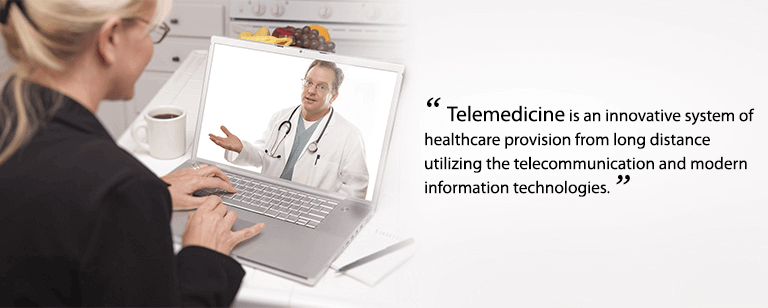Advantages and Disadvantages of Telemedicine
‘Telemedicine’ is an innovative system of healthcare provision from long distance utilizing the telecommunication and modern information technologies. Though this concept arrived in 20th century with telephone & radio, today diverse advanced technologies, including, video telephone, latest tele-medical devices, mobile cooperation technology, diagnostic methods, distributed client or server applications, etc. have upgraded the quality and extent of Telemedicine service.This system has eliminated distance barriers to deliver clinical healthcare. Some major advantages and disadvantages of Telemedicine have been stated below:
Advantages
-
- Many patients feel uncomfortable to go to hospital or doctor-chamber. This system creates communication among patients & healthcare professionals maintaining convenience & commitment. Moreover, through Telemedicine medical information and images are kept confidential and safely transferred from one place to another. So, people can believe this system and feel comfort to seek help from it.
- It saves lives in the emergency situations, while there is no time to take the patient at a hospital.
- In many rural communities or remote places or post-disaster situations, consistent healthcare is unavailable. Telemedicine can be applied in such places or situations to provide emergency healthcare.
- This system is useful for the patients residing in inaccessible areas or isolated regions. Patients can receive clinical healthcare from their home without arduous travel to the hospital.
- Modern innovations of information technology such as, mobile collaboration has enabled easy information sharing and discussion about critical medical cases among healthcare professionals from multiple locations.
- Telemedicine has facilitated patient monitoring through computer or tablet or phone technology that has reduced outpatient visits. Now doctors can verify prescription or supervise drug oversight. Furthermore, the home-bound patients can seek medical-help without moving to clinic through ambulance. Thus, cost of health care has been reduced.
- This system also facilitates health education, as the primary level healthcare professionals can observe the working procedure of healthcare-experts in their respective fields and the experts can supervise the works of the novice.
- Telemedicine eliminates the possibility of transmitting infectious diseases between patients and healthcare professionals.
Tele-neurology consult by Dr.Suresh Kodapala @teleradrxdx,Bangalore for ICU patient in Tanzania -The Future Is Here ! pic.twitter.com/2BpzFARtry
— RxDx (@teleradrxdx) September 9, 2014
Disadvantages
- The overall cost of telecommunication system, especially data management apparatus and practical training of medical professionals is great.
- Virtual clinical treatment decreases human interaction among the healthcare professionals and patients that increases the risk of error in clinical services, if the service is delivered by inexperienced professional. Moreover, confidential medical information can be leaked through faulty electronic system.
- Telemedicine might take longer time for the difficulties in connecting virtual communication due to low internet speed or server problem. Moreover, this system cannot provide immediate treatment, such as, antibiotics.
- Low quality of health informatics records, like, X-ray or other images, clinical progress reports, etc. run the risk of faulty clinical treatment.
- Telemedicine system requires tough legal regulation to prevent unauthorized and illegal service providers in this sector.
For booking, appointment call us today!!! If you have further questions then please contact us on. ![]()

![]()




